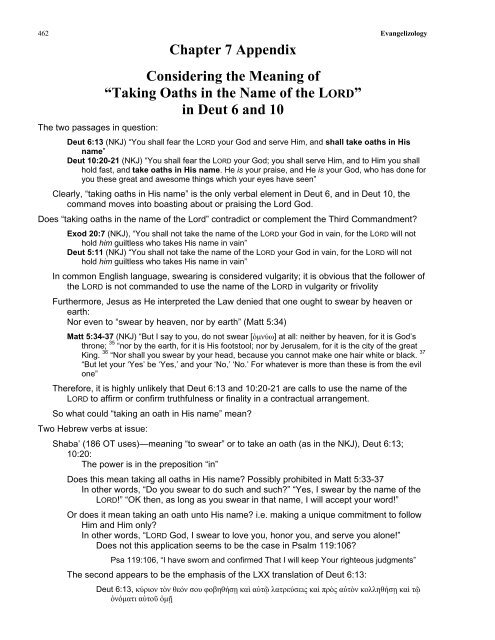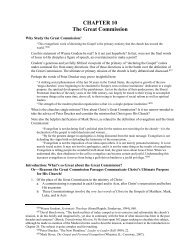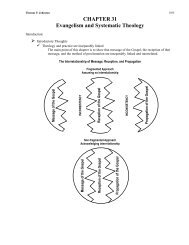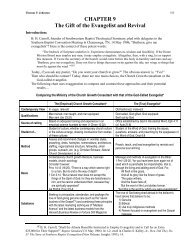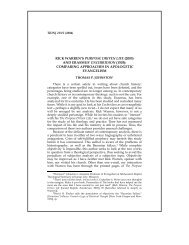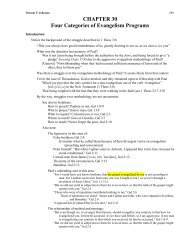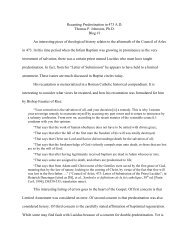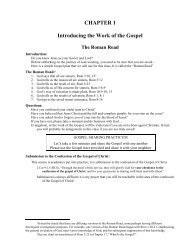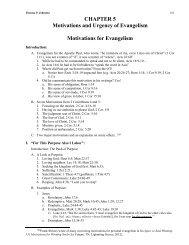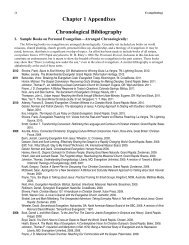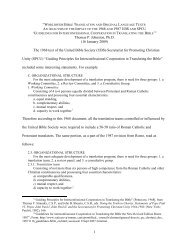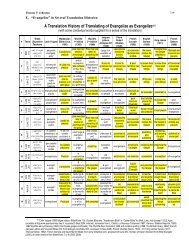CHAPTER 7 Defining Evangelizing - Evangelism Unlimited
CHAPTER 7 Defining Evangelizing - Evangelism Unlimited
CHAPTER 7 Defining Evangelizing - Evangelism Unlimited
Create successful ePaper yourself
Turn your PDF publications into a flip-book with our unique Google optimized e-Paper software.
462 Evangelizology<br />
Chapter 7 Appendix<br />
The two passages in question:<br />
Considering the Meaning of<br />
“Taking Oaths in the Name of the LORD”<br />
in Deut 6 and 10<br />
Deut 6:13 (NKJ) “You shall fear the LORD your God and serve Him, and shall take oaths in His<br />
name”<br />
Deut 10:20-21 (NKJ) “You shall fear the LORD your God; you shall serve Him, and to Him you shall<br />
hold fast, and take oaths in His name. He is your praise, and He is your God, who has done for<br />
you these great and awesome things which your eyes have seen”<br />
Clearly, “taking oaths in His name” is the only verbal element in Deut 6, and in Deut 10, the<br />
command moves into boasting about or praising the Lord God.<br />
Does “taking oaths in the name of the Lord” contradict or complement the Third Commandment?<br />
Exod 20:7 (NKJ), “You shall not take the name of the LORD your God in vain, for the LORD will not<br />
hold him guiltless who takes His name in vain”<br />
Deut 5:11 (NKJ) “You shall not take the name of the LORD your God in vain, for the LORD will not<br />
hold him guiltless who takes His name in vain”<br />
In common English language, swearing is considered vulgarity; it is obvious that the follower of<br />
the LORD is not commanded to use the name of the LORD in vulgarity or frivolity<br />
Furthermore, Jesus as He interpreted the Law denied that one ought to swear by heaven or<br />
earth:<br />
Nor even to “swear by heaven, nor by earth” (Matt 5:34)<br />
Matt 5:34-37 (NKJ) “But I say to you, do not swear [ὀμνύω] at all: neither by heaven, for it is God’s<br />
throne; 35 “nor by the earth, for it is His footstool; nor by Jerusalem, for it is the city of the great<br />
King. 36 “Nor shall you swear by your head, because you cannot make one hair white or black. 37<br />
“But let your ‘Yes’ be ‘Yes,’ and your ‘No,’ ‘No.’ For whatever is more than these is from the evil<br />
one”<br />
Therefore, it is highly unlikely that Deut 6:13 and 10:20-21 are calls to use the name of the<br />
LORD to affirm or confirm truthfulness or finality in a contractual arrangement.<br />
So what could “taking an oath in His name” mean?<br />
Two Hebrew verbs at issue:<br />
Shaba’ (186 OT uses)—meaning “to swear” or to take an oath (as in the NKJ), Deut 6:13;<br />
10:20:<br />
The power is in the preposition “in”<br />
Does this mean taking all oaths in His name? Possibly prohibited in Matt 5:33-37<br />
In other words, “Do you swear to do such and such?” “Yes, I swear by the name of the<br />
LORD!” “OK then, as long as you swear in that name, I will accept your word!”<br />
Or does it mean taking an oath unto His name? i.e. making a unique commitment to follow<br />
Him and Him only?<br />
In other words, “LORD God, I swear to love you, honor you, and serve you alone!”<br />
Does not this application seems to be the case in Psalm 119:106?<br />
Psa 119:106, “I have sworn and confirmed That I will keep Your righteous judgments”<br />
The second appears to be the emphasis of the LXX translation of Deut 6:13:<br />
Deut 6:13, κύριον τὸν θεόν σου φοβηθήσῃ καὶ αὐτῷ λατρεύσεις καὶ πρὸς αὐτὸν κολληθήσῃ καὶ τῷ<br />
ὀνόματι αὐτοῦ ὀμῇ


